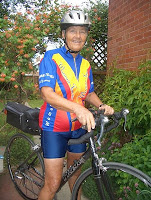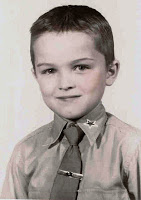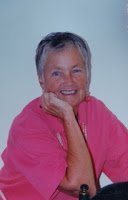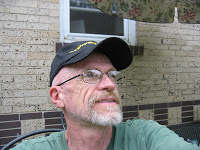As
one of our group members stated in his writing to this topic, “all writing is
experimental.” The Muse finally struck
me upside my head and so, what follows is her experimental writing. She hopes you will find this, amuseing as this story is based on an
actual event I witnessed while my family was visiting a close friend in Tucson
a few years back.
Attack of the Giant Cootie
“Daaaad!
Someone just drove into our driveway.”[I wonder who that could
be.]
“That’s
my friend Rick and his family. They’re
from South Dakota.” [He doesn’t like to meet strangers so I
didn’t tell him to forestall any whining.] “Didn’t I tell you they were coming for
dinner?”
“No you
didn’t.” [I don’t like to meet strangers. That’s probably why he didn’t tell me.]
“Don’t
worry son. This fact is
interesting. We have two boys, a girl,
and another boy in our family. They have
two girls, a boy, and another girl in their family. The oldest girl is your age—10.” [Hmmmmm.
Wouldn’t it be interesting if their girls married our boys and their boy
married our girl?]
“Yuck! Girls!
I’ll get cooties and they only play with dolls and dress up. I hate that stuff.”[I
am going to be sooooo bored. I need to
find a hiding place until they’re gone — even if I miss dinner!”]
“You’ll
be fine. Don’t make a fuss, and make them
feel welcome.” [Just
don’t embarrass me in front of Rick.]
“Will
they be staying the night?
[I’m not sleeping on the couch or floor so THEY can use MY bed.]
[Silly question. We don’t have room for 8 kids and 4 adults.] “No. Just for a
visit and for dinner.”
“Ok
Dad. I’ll be good. Wait!
Is that their oldest daughter?
She’s huge!” [A
giant cootie.]
“Yes. That’s her. She is rather tall for a 10-year old. Her mother told me that she is as far above
the normal growth curve for girls as a girl’s normal growth curve is above a
boy’s normal growth curve. Since you’re
short for your age she will appear quite large next to you. But, she is also a tomboy, so she’ll probably
like the same things you do.”
[I hope they get along. I can’t
stand it when he whines about anything.]
“Yeah,
but her size bothers me and she still has cooties.” [What’s a tomboy?]
“Now
listen! These are my friends and I
expect you to be nice.”
[I hope he obeys me this once.]
“Okay,
I’ll do my best.” [Dad
can’t see that I have my fingers crossed behind my back].
“Uncross
your fingers and let’s go meet our guests.”
…..
“Glad to
meet you too, Mr. Dawson.” [What
happened? He shook my hand then my tummy
feels funny and it’s harder to breath. Why
do I feel this way?]
“Nice to
meet you, Mrs. Dawson.” [I like her smile. She seems friendly enough.]
“Hi.” [Ugh! I’m shaking hands with a giant cootie. If she were any taller my neck would break
from looking up at her. I gotta get away
from her and wash my hands. I think I
might pass out.]
“Are you
okay?”
[He looks pale like he’s going to
faint.]
“Excuse
me; I need to use the bathroom.” [She
sounds sincere, but…]
“Are you
okay, son?” [I
hope he’s not getting sick. He looks
pale like he might pass out.]
“Yeah
Dad. I’m okay.” [Just a few more feet to safety. Okay. I’m
locked in the bathroom. I’m safe. Just splash a little cold water on my
face. Ahhhh that feels good. I’m breathing easier. A bit more water should do it. Oh yeah.
Now I can breathe okay. Even my
tummy is feeling better but is a bit tingly.
I wonder what happened. It
started when I shook hands with Mr. Dawson.
Why did that make me feel funny and not be able to breathe easy? Did the giant cootie have anything to do with
it? Did she make it worse? Uh oh.
It’s all starting again. Maybe
more water in my face…Yeah. That’s
better. Mr. Dawson is a good looking
man. Oh no. Here it comes again. I need more water. Ahhhhh. That did it.
I’m alright again. I guess I
should not think about Mr. Dawson. Oops. More water.
Who’s that knocking on the door?]
“Are you
okay in there, son?” [I
wonder what’s taking so long. Maybe I
should have THAT talk with him after our guests have gone.]
‘Yeah,
Dad. I’ll be out in a minute.” [Out,
but hiding somewhere else in the house.]
…..
[Ahhhh. They’re all in the livingroom. I promised dad to be good and make them feel
welcome so I can’t hide in my bedroom they’ll find me and dad will be
angry. Where can I hide? Hmmmmm.
The kitchen? No, it’s too open.
The hallway? No, that’s even more
open dummy. The closet? No, I’m already in there. The attic?
That’s dumb. We’ve been told to
stay out of there because of the spiders.
I hate spiders worse than cooties.
I know! I’ll hide under the
dining room table. That way I can hear
the conversation in the livingroom but not be seen so if I’m questioned later I
will know what was said. Yeah, that’s a
great plan. I’ll just crawl under the
end nearest the window and they won’t be able to see me from the livingroom or
the kitchen. Owww! Gotta remember not to raise my head too much
or I’ll hit the table again. Now, I’ll
just relax and wait.]
“Hi
whatcha doing under there?” [Is he
playing at being a spy?]
“Owww! Just looking for a nickel I dropped.” [How did she find me?]
“Oh. Sorry I startled you. Do you want me to help look for it?”
“No. I just found it.” [Lucky for me there really is a nickel
under here.] “Owww!” [Dang it!]
“Did you
bump your head again?” [What
a klutz] “Your name is Jason, right?”
[Why is she standing so
close to me? I’ll get big cooties.] “Yes. And your name is Suzie.” [’ll just backup a step to get more
space between us.]
“No, my name is Susan.
No one calls me ‘Suzie’ except my grandmother.” [Why is he backing up? Is he going somewhere? I’ll just follow him.]
“Oh, sorry. Are you
really only 10 years old?” [She’s
coming closer. Danger! Danger, Will
Robinson! I’m being attacked by a giant cootie. I’m going to backup two steps this time.]
“Yes just
turned ten last November. I’m very tall
for my age.” [There he goes again. I’ll just follow his lead. My dad said not to make fun of his size but
I want him to say it before I believe it.] “Are you really 10,
because you look younger?”
[She’s closing in for the
kill.] “Yes I’m 10 and I can’t help that I’m short for my age
right now. Dad says that I’ll grow like
a weed in a year or two. I can’t wait
for it to happen.” [Okay
this time back up THREE steps.]
[Wow. He sounded irritated by my question.] “Do you get picked on
by bigger boys?”
“Yes I do.” [I
move back THREE steps and she follows keeping one foot between us. She is scaring me. I’ll back around the table this time.]
[He’s backing away again
like he’s afraid of me.] “Well, in my class, I don’t let any of the bigger
boys pick on anyone. When they tried, I
made them back down. If you were in my
class, I would protect you from them.” [I
like this little guy.]
[I like her attitude but…] “If you did that, it would be worse for me after
school. The bullies would pick on me
even more whenever you were not around.” [Ooops. The wall is at my back. I can’t back up any further. What can I do? Wait.
There’s a chair. I’ll drag it
over here and stand on it.]
[Now what’s he up too? Standing on a chair so he becomes taller than
me? Because I’m so tall does he think I am
going to pick on him?] “At recess at my school, I play baseball, football, and
basketball. Do you play any of those?”
[She likes sports? Weird.] “I’m too small to be much good at any of them but I do like
to play them. Do you want to go into the
backyard and play catch?”
“Sure.”
“I’ll go
get my glove and ball and another glove for you too.”
…..
“Well son
they’re all gone now. What did you think
of them?”
“I liked
the family.”
“The whole
family or just Susan?”
“All of
them. You were right, Dad. Susan was okay and does like the things I
like. We played catch and other games.”
“And what
about the cooties?”
“Well. Susan is okay, but all other girls have
cooties.”
“Even
your sister?”
“No. She is okay too. But all the others DO have cooties.”
“Hold
that thought, son; at least until you are 18.”
© 7
September 2015
About the
Author
I was born in June of 1948 in Los Angeles, living first in Lawndale
and then in Redondo Beach. Just prior to
turning 8 years old in 1956, I was sent to live with my grandparents on their
farm in Isanti County, Minnesota for two years during which time my parents
divorced.
When united with my mother and stepfather two years later
in 1958, I lived first at Emerald Bay and then at South Lake Tahoe, California,
graduating from South Tahoe High School in 1966. After three tours of duty with the Air Force,
I moved to Denver, Colorado where I lived with my wife and four children until
her passing away from complications of breast cancer four days after the 9-11-2001
terrorist attack.
I came out as a gay man in the summer of 2010. I find writing these memories to be
therapeutic.
My story blog is, TheTahoeBoy.Blogspot.com.





